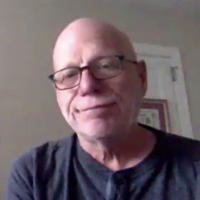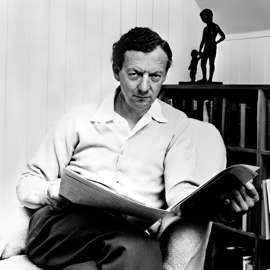- Giuseppe Guttoveggio
- Valentyn Vasylyovych Sylvestrov
- UK
- Uruguay
- David Watkin
- Korngold: 4 Lieder nach Shakespeare
- Roberta Michel
- Schott Music Group
 VIDEO INTERVIEW: Ona Jarmalavičiūtė talks to American choral conductor Donald Nally, director of The Crossing, in this fascinating, illustrated, one hour programme.
VIDEO INTERVIEW: Ona Jarmalavičiūtė talks to American choral conductor Donald Nally, director of The Crossing, in this fascinating, illustrated, one hour programme.
 SPONSORED: Ensemble. Last Gasp of Boyhood. Roderic Dunnett investigates Jubilee Opera's A Time There Was for the Benjamin Britten centenary.
SPONSORED: Ensemble. Last Gasp of Boyhood. Roderic Dunnett investigates Jubilee Opera's A Time There Was for the Benjamin Britten centenary.
All sponsored features >>
Witold Lutosławski
Polish composer and conductor Witold Lutosławski was born on 25 January 1913 in Warsaw, where he studied piano and composition as a youth. His first pieces were influenced by Polish folk music, but from the late 1950s he began formulating his own compositional techniques, which involved randomness and building harmonies from small groups of intervals.
During World War II he served with a radio unit for the Kraków Army, was captured by German soldiers, escaped whilst being marched to prison camp, walked 400km back to Warsaw, then played piano duo in cafes with Andrzej Panufnik to earn a living.
A few days before the Warsaw Uprising, Lutosławski and his mother left the city, taking with him just a few scores and sketches. The rest of his music and the family's estates were lost when Warsaw was completely destroyed by the Germans. He returned in 1945, after the Polish-Soviet treaty, and managed to salvage sketches of his first symphony, which was performed in 1948.
There then followed a difficult period under Stalinist rule, when his first symphony was deemed 'formalist' and he was shunned by the authorities. Panufnik defected to the UK in 1954, but Lutosławski stuck it out, writing 'functional' music for which there was a need, and earning the Prime Minister's Prize for a set of children's songs.
After Stalin's death, Lutosławski's 1954 Concerto for Orchestra established him as an important art music composer, and he won two state prizes the following year. His first international recognition came in 1958 with Musique funèbre, written to commemorate the tenth anniversary of Bartók's death.
In 1963, he wrote Trois poèmes d'Henri Michaux to a commission from Music Biennale Zagreb, his first international commission, bringing a second State Prize for music, further international notice, and an agreement with Chester Music to publish his compositions internationally. By 1965 his song cycle Quatre tapisseries pour la Châtelaine de Vergi was dedicated to Peter Pears and first performed by him at the Aldeburgh Festival, leading to a lasting friendship with Benjamin Britten.
The rest of his life was filled with international prizes and commissions. In the 1980s he gave artistic support to the Solidarity movement, and in 1989, following the reforms in Poland, he became president of the newly reconstituted 'Polish Cultural Council' in the new independent republic of Poland.
A few weeks before dying of cancer on 7 February 1994, aged eighty-one, he was presented with Poland's highest honour - the Order of the White Eagle.
A selection of articles about Witold Lutosławski
Classical music news - Australian Chamber Orchestra Celebrations - The Sydney-based ACO celebrates three important anniversaries with two tours
Ensemble. Contrasting Moods - Mike Wheeler, in his last report from this year's Buxton Festival, is impressed by Sacha Rattle and Peter Donohoe
CD Spotlight. Approachable Music - The complete violin and piano music of Lutosławski and Penderecki, strongly recommended by Geoff Pearce. 'The performances by violinist Michael Foyle and pianist Maksim Štšura are responsive, intelligent and very polished and I, for one, found this disc a delight.'
Classical music news. Stanisław Moniuszko Competition - The deadline for applications to take part in a new Polish music competition is 23 June 2019
CD Spotlight. Very Weird - Orchestral music by Witold Lutoslawski, heard by Gerald Fenech. 'This is meaty music through and through and, admittedly, for some this may be off-putting.'
Ensemble. Mathematical Advantage - Sinfonia Viva's annual schools residency, experienced by Mike Wheeler
Ensemble. An Individual Spirituality - Contemporary music from London's Trinity Laban Conservatoire, heard by Malcolm Miller
CD Spotlight. Clear Tonal Focus - Music for cello and piano by Krzysztof Meyer, recommended by Patric Standford. '... fine playing ...'
CD Spotlight. Expressive warmth - Christmas and other music by Lutoslawski, reviewed by Mike Wheeler
Ensemble. A veritable dynamo - A conversation with Paavo Järvi, and a review of his Miami concert in April, by Lawrence Budmen
Ensemble. An ambitious concert - Rex Harley listens to Tchaikovsky, Lutoslawski and Szymanowski in Wales
Virtuoso demands - Robert Anderson listens to music by Poul Ruders, Lutoslawski and Sibelius in London's Royal Albert Hall

